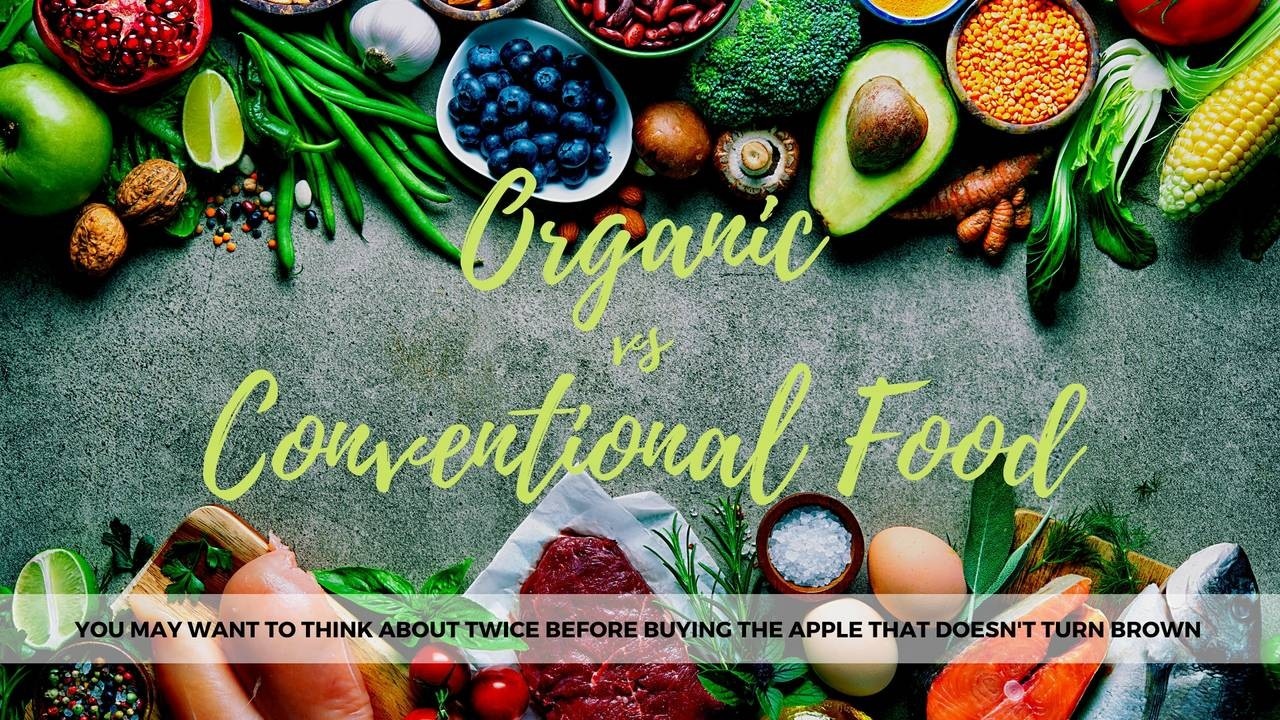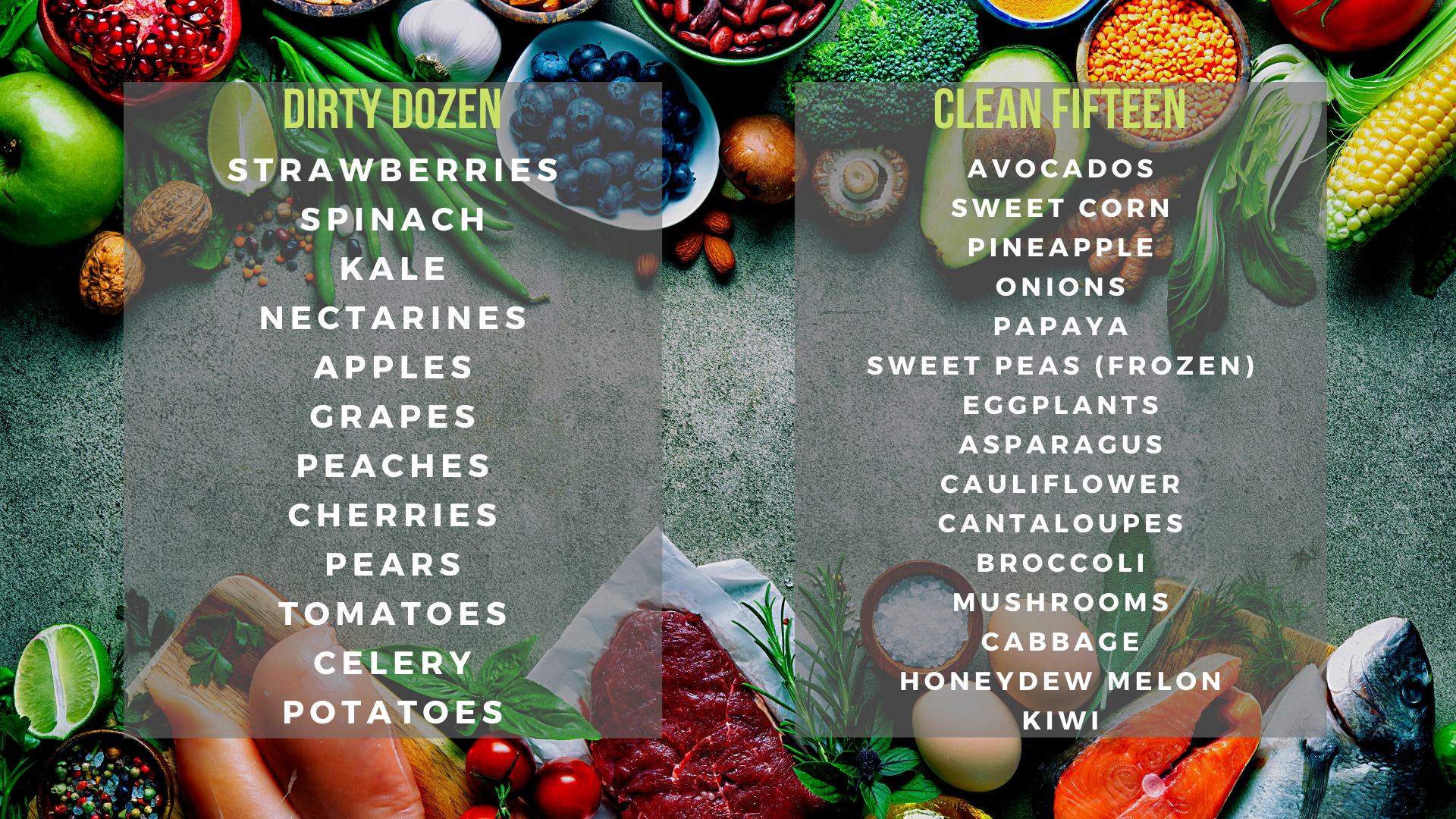
Organic vs Conventional Foods
Aug 17, 2020I often get asked what is the difference is between organic and conventional groceries. One obvious difference that is easy to point out is the price. Typically organic produce will be a little more expensive than conventional produce. So why should you spend your hard-earned money on more expensive food? Read on to learn more!
What Does Organic Mean?
Let’s start by talking about what the terms organic and conventional mean. Organic foods are produced without any pesticides or other chemicals, antibiotics, hormones, or genetically modified organisms (GMOs). To be labeled as organic it must also be free of artificial sweeteners, preservatives, coloring, and flavors. On the other hand, conventionally raised foods are commonly from a genetically modified seed so that they can grow faster, yield more, and be more resistant to disease or pests. Conventionally raised food typically involves the use of chemicals, antibiotics, hormones, as well as artificial additives. Let’s dive deeper into how this affects us.
Toxic Burden Potential
Conventionally raised produce utilizes chemicals in pesticides that help control insects, weeds, fungus, mold, rodents, and algae. Pesticides can be extremely toxic to humans affecting the endocrine system, neurotransmitter signaling, and negatively affecting the microbiome.
Glyphosate
Glyphosate, specifically, negatively affects the shikimate pathway of plants and bacteria. Commensal bacteria in plants help them to extract nutrients and defend against pathogens. The shikimate pathway produces the essential amino acids tyrosine, tryptophan, and phenylalanine. (An essential amino acid means that it is one that must be obtained through the diet. The human body cannot create it). Glyphosate is routinely applied to crops that are genetically modified. Genetically modified organisms have been modified in a laboratory in a way that does not occur in nature or traditional crossbreeding. Typically, GMO crops can withstand applications of glyphosate while the weeds cannot. This also leads to the development of “superweeds”. Superweeds require more pesticides to achieve the death of the weed.
Pesticides
Pesticides can accumulate in the soil, depleting the nutrient quality of the soil. Pesticides can also accumulate in the body if the rate of intake is greater than the excretion. This is greatly impacted by if the detox pathways are compromised or overburdened due to the number of toxins one is exposing themself to. You can perform an EnviroTox Test from Great Plains Laboratory to see if pesticides are contributing to your symptoms.
CAFO
Confined Animal Feeding Operations (CAFO) are popular in conventional farming as well. Growing up on a farm in Iowa myself, this is how I thought all livestock was raised. It wasn’t until I moved to Colorado that I learned about free-range farming. CAFO animals are confined to a lot or facility and fed unnatural diets, typically of grains which can compromise their microbiome. Due to their close living quarters, disease is more prevalent (especially if their microbiome is compromised) so antibiotic use is common. Hormones usage is also common to “speed up” the growing process of animals. These antibiotics and hormones are then transferred to humans when we consume these products. You can learn more about CAFOs and their impact on health according to the CDC here.
Nutritional Value of Organic Foods
Organically raised produce and livestock have been shown to contain more antioxidants, vitamins, minerals, and omegas. Organic farming limits the chemicals that can be used which could potentially affect the soil quality. If the soil is lacking in nutrients, it will, in turn, affect the nutrients in our produce and/or livestock - both free-range and conventionally raised. And as I mentioned before CAFO animals are not grazing on food from the land, but rather an unnatural diet, usually compromised of GMO grains.
Organic Groceries on a Budget
While cheaper, conventional is temping, also consider the long-term effects these food choices could have on your health and wellness and the costs that may be associated with that journey.
Here are a few tips for making organic options more affordable for you:
-
Buy in-season, local fruits, and vegetables. Seasonal produce is more available which will drive down the cost. You can do a quick google search to see what produce is in season in your area and shop your local farmers market.
-
Shop frequently. Yes, I know you may not enjoy it but you should be heading to the grocery store or ordering online about every 7-10 days. Organic produce does not have a long shelf life so you may notice that it will spoil sooner than conventional produce. Shopping in-season, local produce will also help with the shelf life of your produce as it did not spend as much time on a truck being transported.
-
Freeze your produce. I do this ALL the time with berries, bananas, cauliflower, and spinach. When your produce is nearing the end of its “freshness” you can just put it in the freezer to use with smoothies. You can blanch other veggies to freeze so you can cook them without them being soggy.
-
Sign up for a local CSA or meat delivery service. It’s almost like getting a mystery box on Chopped but with better ingredients! You can then create your meal plan based on your delivery or reach out to me to create customized meal plans to help reduce food waste. For my local Denver friends, check out Locavore and receive $20 off your order with my referral code. It’s seriously the best tasting beef, pork, chicken, and salmon I’ve ever tasted. You can customize your box each month too. Splitting your box with a friend is always a great option as well!
-
Follow the EWG’s Dirty Dozen and Clean Fifteen guidelines. Every year the Environmental Working Group compiles a list of the “dirtiest” and “cleanest” produce available based on testing done by the Department of Agriculture and the Food and Drug Administration for the pesticides that are detected on the produce. The produce is thoroughly washed, peeled (if applicable), and tested. You will want to strive to always buy organic of the produce on the Dirty Dozen. You can learn more about the test results by visiting their website. Here are the lists for 2020

Source: The Environmental Working Group
The information available on this website is for general health information only and is not intended to be a substitute for professional medical advice, diagnosis or treatment. You should not rely exclusively on information provided on the Website for your health needs. You can read more about our disclaimer here.
Are you overwhelmed by all of the conflicting information regarding health, hormones, nutrition, and weight management?
Join me once a month for a FREE "Ask Me Anything" live Zoom sesh! I'll answer all the questions you've been spending so much time searching the internet for.









